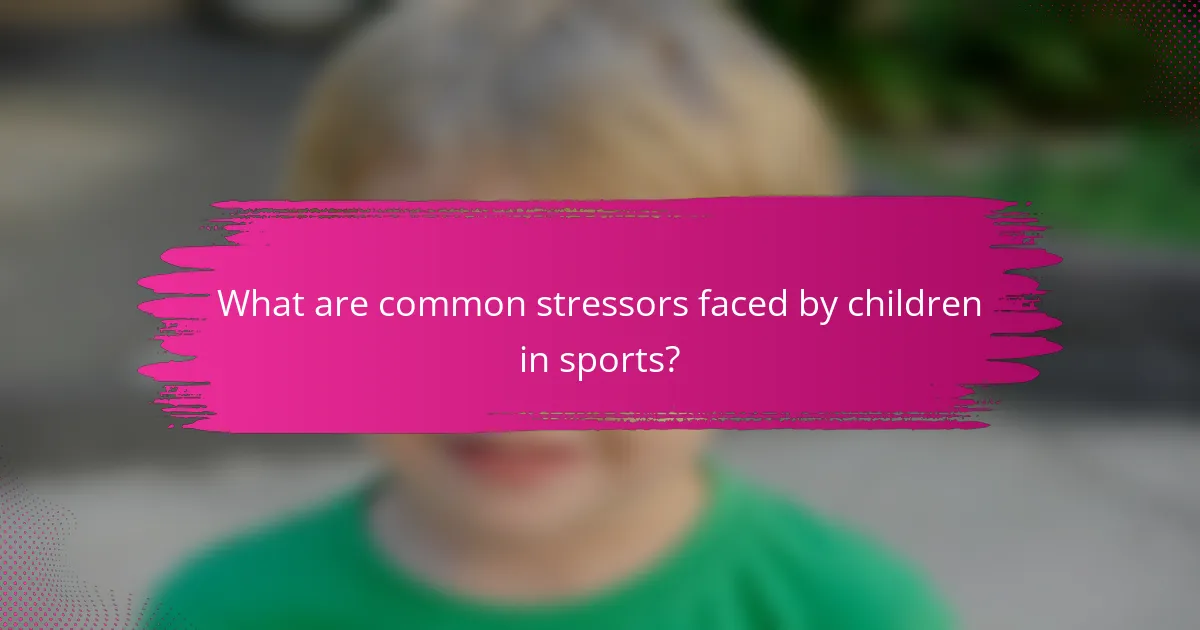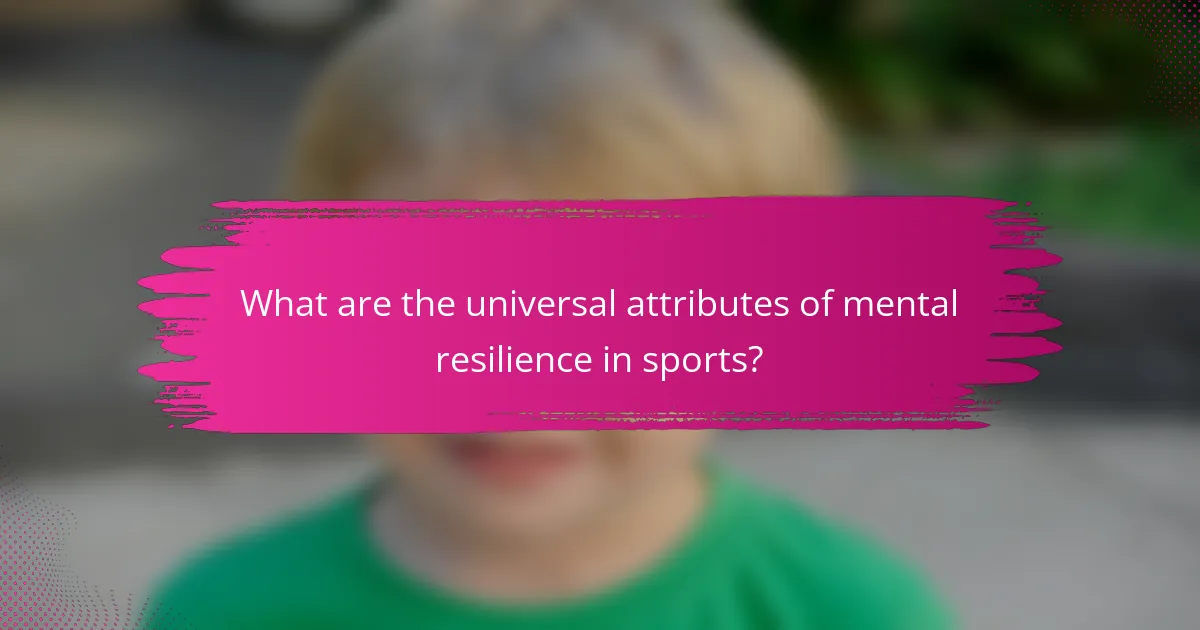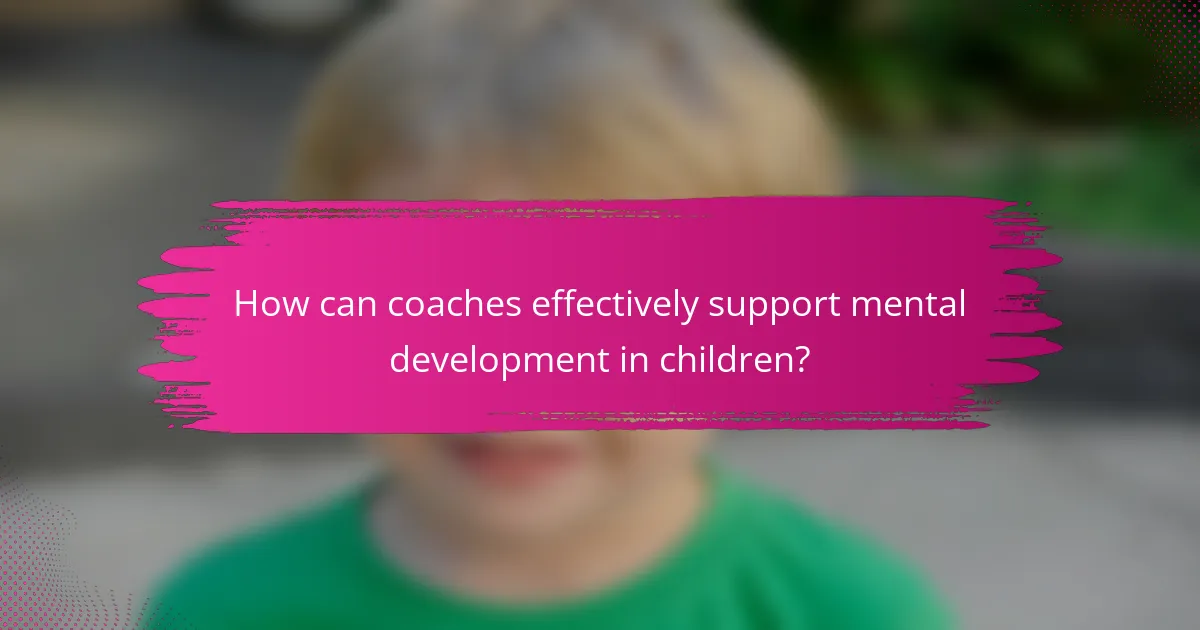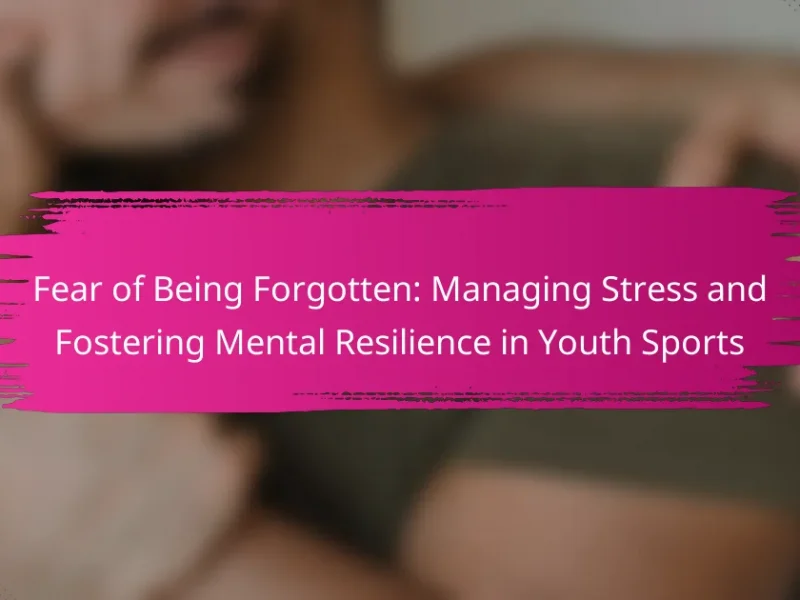Understanding organized chaos in children’s sports activities is essential for fostering mental development and managing stress. This article explores the role of mental resilience, the impact of performance pressure, and strategies for coaches and parents to support young athletes. It highlights the importance of emotional regulation, adaptability, and creating a positive sports environment. By addressing these factors, we can enhance children’s enjoyment and growth in sports.

What is the role of mental development in children’s sports?
Mental development plays a crucial role in children’s sports by enhancing focus, resilience, and teamwork. It helps children manage stress and anxiety, leading to improved performance and enjoyment. Engaging in sports fosters cognitive skills, such as decision-making and problem-solving, which are essential for personal growth. As a result, children develop a positive mindset that supports their overall mental health and social interactions.
How does participation in sports influence cognitive growth?
Participation in sports significantly enhances cognitive growth in children. Engaging in organized sports fosters critical thinking, problem-solving, and teamwork skills. These activities require children to make quick decisions, adapt strategies, and collaborate with peers, all of which stimulate mental development.
Research indicates that children involved in sports show improved concentration and academic performance. For instance, a study found that regular physical activity correlates with higher grades in school. Furthermore, the unique attribute of sports is the ability to manage stress, as children learn to handle competitive pressure and setbacks, promoting resilience.
Additionally, sports participation encourages social interaction, which is vital for cognitive growth. Children develop communication skills and emotional intelligence through teamwork and shared experiences. This social aspect of sports contributes to a well-rounded cognitive development framework.
What are the key stages of mental development in young athletes?
The key stages of mental development in young athletes include awareness, understanding, and application. These stages help children navigate stress and enhance their performance in sports activities.
Awareness involves recognizing emotions and stressors during competition. Understanding focuses on processing these feelings and their impact on performance. Application is the ability to implement coping strategies and mental techniques to manage stress effectively.
These stages are crucial for fostering resilience and confidence in young athletes, enabling them to thrive in competitive environments.
What cognitive skills are enhanced through sports?
Sports enhance cognitive skills such as decision-making, focus, and teamwork. These skills are developed through the structured chaos of sports activities, which require quick thinking and adaptability. Engaging in sports fosters problem-solving abilities as children navigate dynamic game situations. Research indicates that participation in sports correlates with improved academic performance, particularly in areas requiring critical thinking. Thus, sports serve as a vital platform for mental development in children.
How does teamwork contribute to social development?
Teamwork enhances social development by fostering communication, collaboration, and empathy among children. Engaging in team sports helps children learn to work toward common goals, developing social skills essential for future interactions. Participating in organized activities cultivates a sense of belonging and community, which is crucial for emotional growth. As a result, teamwork in sports not only improves physical abilities but also nurtures interpersonal relationships and social responsibility.

What are common stressors faced by children in sports?
Children in sports often face stressors like performance pressure, competition anxiety, and parental expectations. These factors can impact their mental development and enjoyment of the activity.
Performance pressure arises from the desire to excel, leading to anxiety about meeting expectations. Competition anxiety can stem from fear of failure or comparison with peers. Parental expectations may create additional stress, as children feel the need to please their guardians.
These stressors can hinder a child’s overall experience in sports, affecting their mental health and development. Addressing these challenges is crucial for fostering a positive sports environment.
How do performance expectations impact young athletes?
Performance expectations can significantly impact young athletes by influencing their motivation, stress levels, and overall enjoyment of sports. High expectations may lead to increased pressure, which can result in anxiety and decreased performance. Conversely, realistic and supportive expectations can foster resilience and a positive mindset. Establishing a balanced approach helps young athletes navigate the complexities of competition while promoting mental development.
What role does parental pressure play in children’s sports stress?
Parental pressure significantly contributes to children’s sports stress by creating unrealistic expectations. This pressure can lead to anxiety, decreased enjoyment, and burnout among young athletes. Studies show that children subjected to high parental expectations often experience heightened stress levels, impacting their performance and mental health. Balancing encouragement with support is crucial to fostering a positive sports environment for children.
How can competition contribute to anxiety in young players?
Competition can heighten anxiety in young players by creating pressure to perform. This stress can stem from fear of failure, peer comparisons, and high expectations from coaches and parents. As a result, players may experience diminished enjoyment and increased mental strain during sports activities. Studies show that excessive competition can lead to burnout and withdrawal from sports altogether. Understanding these dynamics is crucial for fostering a healthier sporting environment.

What are the universal attributes of mental resilience in sports?
Mental resilience in sports includes adaptability, focus, emotional regulation, and confidence. These attributes enable athletes to manage stress and perform under pressure. Adaptability allows for quick adjustments during competition. Focus enhances concentration on tasks, reducing distractions. Emotional regulation supports maintaining composure in challenging situations. Confidence fosters belief in abilities, driving performance. Together, these universal attributes contribute to an athlete’s mental strength and overall success in sports.
How does mental resilience affect performance outcomes?
Mental resilience significantly enhances performance outcomes by enabling children to manage stress effectively. It fosters adaptability, allowing young athletes to overcome challenges and maintain focus during competitions. Research indicates that resilient children demonstrate improved emotional regulation, which correlates with higher levels of performance. For instance, a study found that athletes with strong mental resilience are more likely to persist through setbacks, leading to better results over time. This unique attribute of mental resilience not only boosts confidence but also encourages a growth mindset, essential for long-term success in sports.
What strategies can enhance mental resilience in young athletes?
To enhance mental resilience in young athletes, focus on fostering a growth mindset, encouraging positive self-talk, and teaching stress management techniques. These strategies help athletes cope with pressure and setbacks effectively.
Promoting a growth mindset allows young athletes to view challenges as opportunities for improvement. Positive self-talk reinforces confidence and reduces anxiety. Stress management techniques, such as mindfulness or breathing exercises, equip athletes with tools to handle competitive stress.
Incorporating these strategies into training routines creates a supportive environment that nurtures mental resilience. Regularly practicing these skills can lead to improved performance and overall well-being in young athletes.

What unique challenges do children face in sports environments?
Children in sports face unique challenges, including pressure to perform, social dynamics, and emotional regulation. These factors can lead to stress and anxiety, impacting their mental development. The competitive nature of organized sports often creates an environment where children feel they must constantly prove themselves. Additionally, peer relationships can complicate experiences, leading to feelings of isolation or exclusion. Emotional resilience is crucial, as children must learn to cope with both success and failure. Understanding these challenges can help coaches and parents provide better support.
How does the transition from recreational to competitive sports affect mental health?
Transitioning from recreational to competitive sports can significantly impact children’s mental health. Increased pressure and expectations can lead to stress and anxiety. Competitive environments often prioritize performance over enjoyment, which may diminish intrinsic motivation.
Children may experience heightened self-esteem when they succeed, but failure can result in feelings of inadequacy. This duality can create a complex mental landscape. Supportive coaching and a balanced approach can help mitigate negative effects.
Research indicates that children involved in competitive sports often develop resilience and improved coping skills. However, it is crucial to monitor their emotional well-being to ensure healthy development.
What are the unique stressors in team versus individual sports?
Team sports introduce unique stressors, such as social dynamics and collective performance pressure, which differ from the individual focus in solo sports. In team settings, athletes often face expectations from teammates and coaches, leading to anxiety over group cohesion and shared success. Individual sports, however, emphasize personal responsibility, where stress stems primarily from self-imposed goals and competition against oneself. The interplay of these stressors affects mental development, requiring tailored strategies for coping and resilience in children’s sports activities.

What are rare but notable traits of young athletes under stress?
Young athletes under stress may exhibit rare traits such as enhanced resilience, adaptive problem-solving, and unique emotional regulation. These traits can manifest in their ability to maintain focus under pressure, effectively communicate with teammates, and quickly adjust strategies during competitions. Research indicates that these attributes can significantly improve performance, showcasing a remarkable capacity for mental flexibility and emotional intelligence in challenging situations.
How can emotional intelligence impact stress management?
Emotional intelligence enhances stress management by fostering awareness and regulation of emotions. In children’s sports, it helps them navigate competitive pressures effectively. High emotional intelligence leads to better coping strategies, reducing anxiety and enhancing performance. Children learn to recognize stress triggers and respond constructively, promoting resilience and mental development.
What are the signs of burnout in young athletes?
Young athletes may show signs of burnout through physical and emotional exhaustion, reduced performance, and a lack of enthusiasm. Common indicators include persistent fatigue, irritability, changes in sleep patterns, and withdrawal from sports activities. Monitoring these symptoms is crucial for early intervention and support.

How can coaches effectively support mental development in children?
Coaches can effectively support mental development in children by fostering a balanced environment that encourages resilience and adaptability. They should implement structured yet flexible practices that allow children to experience challenges while providing guidance and support.
Coaches can integrate techniques such as mindfulness exercises to enhance focus and reduce stress. Creating a supportive team culture helps children feel secure, promoting open communication about emotions and challenges. Encouraging goal-setting fosters a sense of achievement and ownership in their development.
Additionally, coaches should recognize individual differences in children’s mental resilience and adapt their strategies accordingly. By prioritizing mental well-being alongside physical training, coaches can cultivate a holistic approach to child development in sports.
What coaching techniques promote a positive mental environment?
Coaching techniques that promote a positive mental environment include fostering open communication, encouraging teamwork, and providing constructive feedback. These techniques help children feel supported and valued in sports activities. Open communication allows athletes to express feelings, reducing anxiety. Encouraging teamwork builds camaraderie, enhancing motivation. Constructive feedback focuses on improvement, cultivating a growth mindset. These attributes contribute to a thriving mental environment, essential for effective mental development in children.
How can coaches help manage stress in young athletes?
Coaches can help manage stress in young athletes by creating a supportive environment and teaching coping strategies. They can implement structured routines, encourage open communication, and promote a growth mindset.
Coaches should prioritize mental wellness by recognizing stress signals and adapting training accordingly. Providing individualized feedback and fostering teamwork can enhance resilience. Regular check-ins can help athletes feel valued and understood, reducing anxiety.
Incorporating relaxation techniques, such as breathing exercises or mindfulness, can further aid in stress management. Coaches must balance competitive drive with emotional support to promote healthy mental development in children’s sports activities.

What best practices can parents adopt to support their children in sports?
Parents can adopt several best practices to support their children in sports. First, they should encourage a balanced approach to competition, emphasizing enjoyment over winning. This promotes a positive mindset and reduces stress.
Next, parents can facilitate open communication, allowing children to express their feelings about sports. This helps in identifying any mental stressors they may face. Additionally, setting realistic goals can enhance motivation and foster resilience.
Creating a supportive environment is crucial. Attending games and practices shows children that their efforts are valued. Finally, promoting teamwork and sportsmanship teaches important life skills and helps children navigate social dynamics in sports.
How can parents balance encouragement and pressure?
Parents can balance encouragement and pressure by fostering a supportive environment while setting realistic expectations. Encouragement should focus on effort and personal growth, promoting a healthy mindset. Pressure can be mitigated by emphasizing enjoyment over competition, helping children develop resilience. Establishing open communication allows parents to gauge their child’s feelings and adjust their approach accordingly. This balance nurtures mental development, reducing stress and enhancing performance in sports activities.
What are common mistakes parents make regarding children’s sports?
Parents often make mistakes by overemphasizing competition, neglecting fun, and failing to recognize individual children’s needs in sports. Overemphasis on winning can lead to stress and burnout. Neglecting enjoyment diminishes motivation and participation. Additionally, not considering a child’s unique abilities and interests can hinder their mental development and overall experience in organized sports.
What expert insights can guide parents in fostering a healthy sports experience?
To foster a healthy sports experience, parents should prioritize emotional support and open communication. Encourage children to express their feelings about competition and teamwork. Establish realistic expectations to reduce stress and anxiety. Promote balance by ensuring sports do not overshadow academics or personal time. Provide positive reinforcement to build confidence and resilience.


